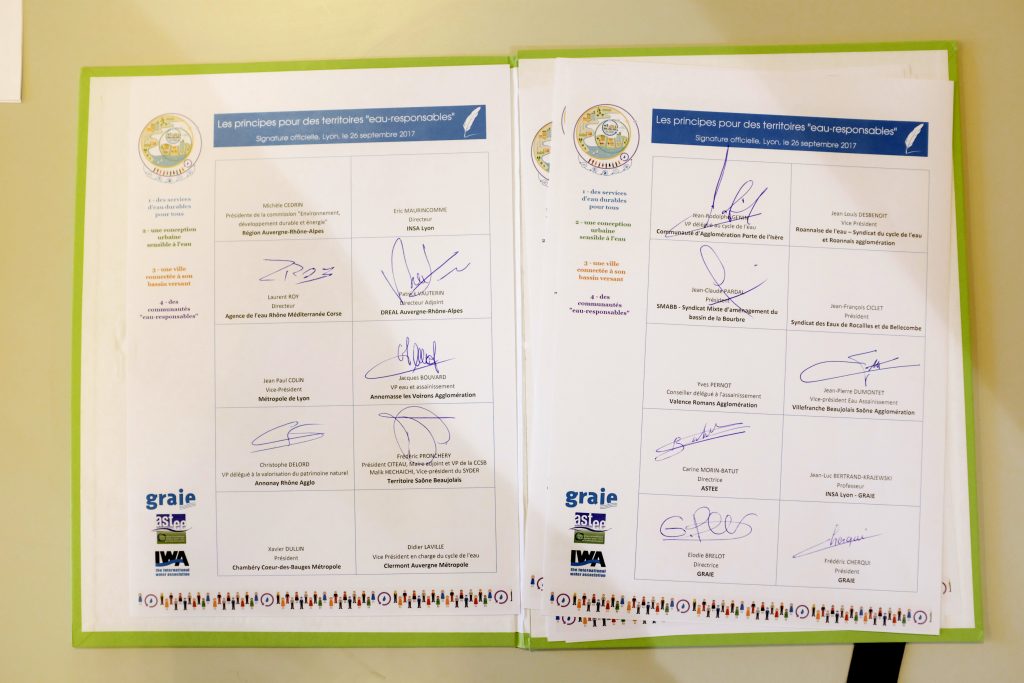Regional collaboration for a water-wise world in Lyon, France
Water is a key element for citizens and for the overall liveability of a city. The Lyon Metropolis benefits from abundant resources from the Rhône River and the associated groundwater, supplying its inhabitants with clean and safe water on a daily basis. Yet, between now and 2030, Lyon expects its population to grow by 300 000 new inhabitants, of which 150 000 in the CBD. If not well planned, growing population density in the city is likely to pose many problems, such as increasing imperviousness, over-use of groundwater, increased flood risks, and higher pollution of aquatic ecosystems through inadequate stormwater management. So how has Lyon Metropolis been working to achieve such ends?
Lyon Metropolis was one of the first endorsing cities of the IWA Principles for Water-Wise Cities, which encourage collaborative action, underpinned by a shared vision, so that local governments, urban professionals, and individuals actively engage in addressing and finding solutions for managing all waters of the city. In support, Graie and ASTEE have made impressive strides to grow the Water-Wise movement in the region. Last week, 12 regional stakeholders united to endorse the Principles for Water-Wise Cities at an official signing ceremony.

Photo ®PluquetPA/ Salon “Louis Pradel” at the Hotel de Métropole. At the end of the “Water, City and Biodiversity” Conference organized by GRAIE, the signing ceremony of a convention concerning the IWA Principles for Water-Wise Cities by municipalities and inter-municipal bodies.
Lisa Andrews spoke to Elodie Brelot, Director of Graie, to discuss how the IWA Principles for Water-Wise Cities enabled cross-collaboration across sectors to drive change in urban water management in Lyon, France.
(The interview is translated from French. Scroll down for the original French version.)
Why did Graie endorse the Principles in 2016?
For the past 30 years, Graie has served as an association bringing together regional groups for a better and sustainable management of water in cities. Graie creates links between the scientific and professional communities for water management and planning. As such, our work is mirrored in the Principles.
At what moment did you decide to engage the groups from Auvergne-Rhone-Alpes?
After Grand Lyon endorsed the Principles in October 2016, it seemed only natural to engage and share the Principles with the other groups in the region.
What does Graie hope to achieve in engaging all relevant stakeholders ?
The first objective is to increase the value of engagement of the groups; the second is to create a community of decision makers and technical managers to drive change. This can happen through sharing experiences, but also by exchanging with other stakeholders (scientists, national authorities, providers…)
Was it difficult to convince them?
Each technical manager ensured that their efforts to achieve the Principles were shared with elected officials. The endorsement was very well received by decision makers, who are also aligning their strategies and actions with others in the region, and along the Principles.
What tips would you give to other professionals who want to organise and activate such a network in their regions?
Believing in the power of shared and unlimited possibilities to bring about new strategies and innovations in the water sector, by ensuring links between the different levels of action and decision-making.
Towards a Water-Wise City Vision… What’s Yours? from IWA on Vimeo.
To find out more about this signing in Lyon, France, check out: http://www.graie.org/graie/eau-responsable.html
Pour quelle raison le Graie a-t-il signé les Principes en 2016?
Le Graie est une association qui anime depuis 30 ans un réseau de collectivités territoriales pour une gestion durable de l’eau dans la ville, en lien avec les scientifiques et autres professionnels de la gestion de l’eau et de l’aménagement. Nous nous reconnaissons totalement dans les principes de l’IWA.
A quel moment avez-vous décidé de mobiliser les collectivités d’Auvergne-Rhône-Alpes?
Après la signature des principes par la Métropole de Lyon en octobre 2016, il nous a semblé intéressant et tout à fait possible de partager ces principes avec les autres collectivités de la région.
Quelles sont les objectifs de cette démarche?
L’objectif premier est de faire valoir l’engagement des territoires et leurs spécificités ; le second objectif est de créer une communauté de collectivités, entre les décideurs et les responsables techniques, afin de progresser ensemble, par l’échange d’expérience, mais aussi le partage avec d’autres acteurs (scientifiques, autorités nationales, prestataires, …)
Est-ce que ce fut difficile de les convaincre?
Chaque responsable technique a œuvré sur son territoire pour partager avec ses élus leurs engagements selon la grille de lecture des principes. L’accueil a été très favorable par les décideurs, qui ainsi mettent en valeur leur stratégie et leurs actions en faveur de territoires eau-responsables.
Quels conseils proposeriez-vous aux autres professionnels pour faciliter une telle mise en réseau sur leurs territoires?
Croire en la puissance du partage d’objectifs et de principes non contraignants pour porter des stratégies nouvelles, innovantes au service d’une gestion durable de l’eau et des territoires. Tisser ces liens aux différents niveaux de l’action et de la décision.
Les Principes de l’IWA pour les Villes « Eau-Responsables » from IWA on Vimeo.
Pour en savoir plus sur cette signature à Lyon, France, consultez: http://www.graie.org/graie/eau-responsable.html
Photographs in this article courtesy of ®PluquetPA.

